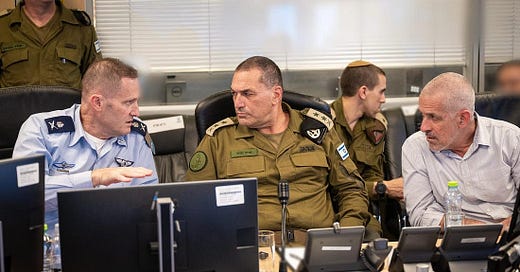The Chief of the General Staff, the Director of the Israel Security Agency, and the Commanding Officer of the IAF, in the IAF’s Underground Operations Center, commanding the strikes in Gaza overnight. (Israel Defense Forces)
Before trying to get to sleep on Monday night, I read that Hamas—amid the lack of progress in the hostage-deal talks since the last Israeli hostages (in this case, remains of hostages) were released on February 26—had been rebuilding its forces to a total of about 25,000 fighters, reorganizing its battalions and brigades, using not-yet-discovered tunnels or possibly building new ones, setting up rocket launchers, and even making renewed efforts to launch cross-border attacks.
It made for depressing reading, and I didn’t drop off before popping some Melatonin. Waking up very early in the morning—as I always do no matter how much or (more commonly) little I’ve slept—and groggily checking my Android screen, I saw that, since the wee hours, the Israeli air force had been subjecting Hamas in Gaza to a major drubbing.
It made sense. Hamas military commanders and government officials were killed and terror infrastructure was pounded. The message was that Israel would not wait passively again while Hamas planned murderous incursions. From now on, such plans will prove deadly to Hamas, not to Israel.
During the day, in Israel, relatives of the 24 or so live hostages still being held in tunnels in Gaza under horrible conditions cried out in anguish that the aerial bombing was endangering their lives. Although efforts were being made to avoid places where they might be, there was no denying that such a danger existed. The abysmal cruelty of Hamas has forced Israel to grapple with dilemmas that are beyond the human ken—and also beyond the capacity for empathy of the many international officials and national leaders who were already, like clockwork, denouncing the Israeli operation if not crowing about “genocide.”
But as veteran Israeli military-affairs commentator Ron Ben Yishai pointed out, a major objective of the Israeli barrage “was to apply military pressure that could break the deadlock in negotiations over hostage releases. Experience within the IDF and Israeli intelligence has shown that such pressure is the most effective way to push Hamas toward flexibility in negotiations.”
As of Tuesday evening, Israel was conveying to Hamas that, if it did not see fit to resume “genuine” negotiations instead of a charade aimed at giving Hamas time to rebuild and plan further rampages, the terror group would be subjected to escalating Israeli strikes.
This time around, Israel has two advantages that make the threat sound real.
First, with the demise of Hizballah and the Assad regime and the severe weakening of Iran, Hamas has no functioning allies left. The Houthis in Yemen have been threatening to resume launching projectiles at Israel, but they themselves are under US attack and some stray drones lobbed at Israel are highly likely to be intercepted and of no help to Hamas.
And second, indications are that this time around Israel has true American backing. There is no question that, from the outbreak of the October 7 war, the Biden administration gave Israel substantial support. But it was support with heavy strings attached, including constant harsh, public, unjustified accusations about the civilian death toll, and unrelenting pressure on Israel to devote huge resources to feeding and supplying a Gazan population that, on the infamous October 7 itself, had reacted with unbridled glee and, in large numbers, poured across the breached border to join the trained terrorists in the atrocities.
But it’s not only a matter of sturdier US support. As Ben Yishai points out, Israel is aiming to
create intense military pressure, coordinated with the US, on all remaining elements of the Shiite "axis of resistance” including Yemen’s Houthis, Hamas and Iran.
This coordination stems, in part, from the US administration’s desire to show regional and global actors that President Donald Trump’s threat to “open the gates of hell” was not empty rhetoric but part of a broader strategy that aims to extract a heavy price from Hamas, the Houthis and Iran itself.
In that regard, Trump’s warnings about holding Iran directly responsible for Houthi aggressions are encouraging.
If Hamas is at all realistic, it will look out from its Gaza enclave at a world in which democracies have gotten serious about defeating barbarians and get serious about freeing the hostages while it still can.





